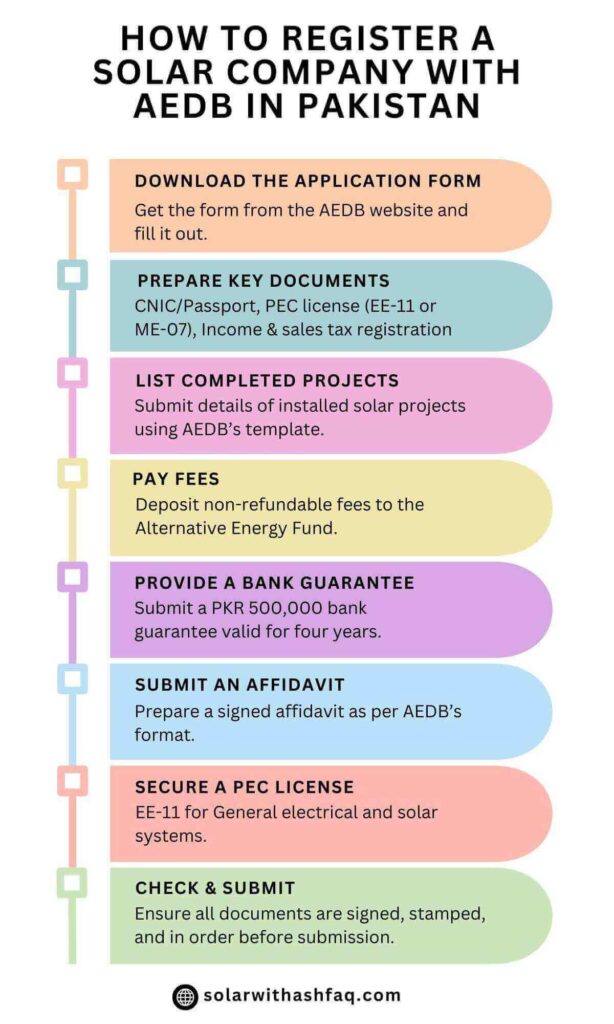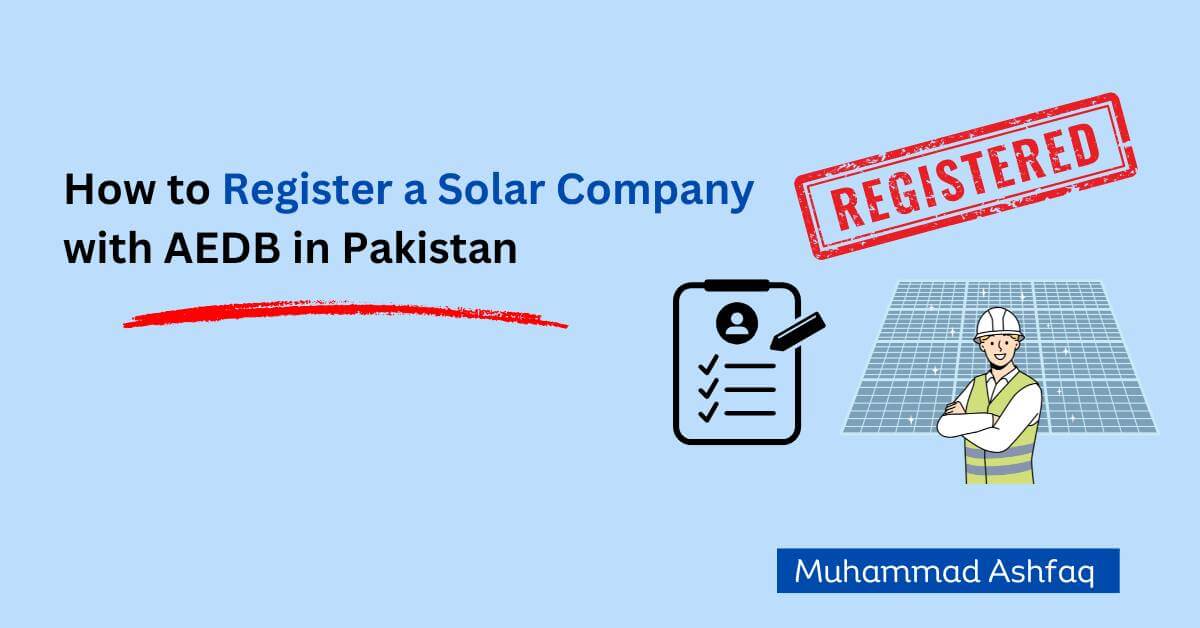How to Register a Solar Company with AEDB in Pakistan
The solar industry in Pakistan is expanding rapidly. With the increasing demand for renewable energy, many entrepreneurs are establishing solar businesses.
However, registering your company with the Alternative Energy Development Board (AEDB) is essential for compliance and credibility.
This guide simplifies the AEDB registration requirements, covering the entire process step by step.
Find Trusted Solar Companies in Your City
No more guesswork! Compare expert-approved solar companies to safe-guard your investment.
Why Solar Installer Registration with AEDB is Compulsory?
Registering under AEDB’s Certification Regulations, 2021 offers several benefits:
- Builds customer trust and brand credibility.
- Makes your business eligible for government projects.
- Opens doors to financial incentives or tax exemptions.
- Improves your competitive advantage in the solar market.
Below is the complete step-by-step process listed for solar energy license requirements in Pakistan.
Check out: Top Solar Provider in Pakistan or compare solar panel prices in your city.
Step 1: Obtain and Complete the AEDB Application Form
Start by downloading the application form from the AEDB website.
This document lays the groundwork for the solar licence application. Fill in all required fields carefully to avoid delays.
Step 2: Prepare the Required Documentation
Ensure you submit all mandatory documents along with the application. Below is a detailed checklist:
1. Authorization and Identification Documents
- Board resolution or authorization letter.
- A copy of your CNIC or passport.
2. Company Profile and Registration
- A brief company profile highlighting your business goals and services.
- Certificate of incorporation (for private limited companies) or a registered partnership deed.
Step 3: Secure a PEC License
Obtaining a license from the Pakistan Engineering Council (PEC) is a vital step. Your PEC certification must align with the following codes for renewable energy systems:
- EE-11: General electrical and solar systems.
- ME-07: General mechanical and solar systems.
The category of your license (C-1, C-2, or C-3) will determine the scale of projects your business can handle.
Step 4: Fulfill Tax Registration Requirements
To get aedb license, your business must comply with Pakistan’s tax regulations. Prepare the following documents:
Income Tax
- Income tax registration certificate.
- Active taxpayer status report (from FBR).
Sales Tax
- Sales tax registration certificate.
- Sales tax returns for the past three months.
Step 5: Register for Provincial Tax Compliance
If you operate in multiple provinces, you’ll need to register for sales tax on services in each province.
Provide:
- Proof of registration under provincial tax laws.
- Active taxpayer status reports.
Step 6: Submit Your Project Portfolio
AEDB requires proof of your experience in solar installations.
Submit a list of completed projects using the specified proforma available on their website.
Step 7: Pay the AEDB registration Fee
The AEDB application processing fee is non-refundable. Deposit the fee in the name of the Alternative Energy Fund and keep the receipt as proof of payment.
The registration fee depends on the type of certification. The details below are valid for three years.
| Catagory | Load Limit | Cost (PKR) |
| C3 | upto 250kw | 755,000 |
| C2 | upto 500kw | 1,225,000 |
| C1 | No Limit | 1,650,000 |
Step 8: Provide a Bank Guarantee
Submit a bank guarantee worth PKR 500,000, valid for four years.
This demonstrates financial reliability and is a mandatory part of the registration process.
Step 9: Submit an Affidavit
Prepare an affidavit on stamp paper signed by you or an authorized representative.
Follow the format provided in Schedule 2, Part I, Sr. No. XI of the AEDB regulations.
Step 10: Finalize Certification Fee Payment
Finally, pay the AEDB certification fee in the name of the Alternative Energy Fund. Submit the proof of payment along with your application.
Step 11: Review and Submit Your Application
Double-check all documents to ensure accuracy. Sign and stamp them where required before submitting your application to AEDB.

Is There a Minimum Business Age Requirement for AEDB Registration?
No, AEDB does not require your business to be operational for a specific time before applying.
However, the board evaluates your experience through completed solar installation projects.
Submitting a detailed project portfolio is critical, even for newer businesses.
How to Verify AEDB Certificate?
To verify an AEDB (Alternative Energy Development Board) certificate in Pakistan, you can follow these steps:
1. Check the AEDB Website
- Visit the official website of PPIB or check this complete list of approved vendors in Pakistan. It contains the updated data from the official website of PPIB.
2. Verify Through PEC Registration
Since AEDB-certified companies are required to have valid Pakistan Engineering Council (PEC) licenses, you can cross-check the company’s PEC registration using their online database.
For that, visit here to check whether their PEC license is valid or not.
Can I Upgrade My AEDB Category Later?
Yes, AEDB allows businesses to upgrade their category. To do this, you’ll need to:
- Submit an updated project portfolio showcasing your company’s growth and successful installations.
- Provide any additional documents or fees required for the higher category.
Upgrading your category can help you take on larger projects and expand your business.
Pro Tips for a Successful AEDB Registration
Start Early
Begin preparations well in advance. Key steps like obtaining PEC licenses and completing tax registrations may take time.
Organize Your Documents
Use a checklist to track your documents. Arrange them in the required order to avoid confusion during submission.
Use AEDB’s Templates
Follow AEDB’s formats for affidavits, project portfolios, and other documents. This reduces the chances of rejection.
Seek Professional Help
If the process feels overwhelming, consult a legal or business expert familiar with AEDB registration.
Verify Tax Compliance
Double-check your tax registrations and ensure all filings, such as sales tax returns, are up-to-date. Inactive taxpayer status can cause delays.
Highlight Your Experience
Emphasize the quality and scale of your installed projects in your project portfolio. It strengthens your application.
Stay Informed
Regulations and requirements can change. Regularly visit the AEDB website to stay updated.
Invest in Training
Ensure your team has qualified professionals for solar installations. This demonstrates technical expertise to AEDB evaluators.
Be Financially Prepared
Set aside funds for the application fee, certification fee, and bank guarantee. This ensures a smooth process without financial hiccups.
Maintain Communication
Follow up with AEDB after submitting your application. Address any feedback or additional requirements promptly.
Conclusion
By following the AEDB process and providing all required documents, your company can become a certified solar installer.
Whether you’re a new business or looking to scale, AEDB certification paves the way for growth in Pakistan’s renewable energy sector.
Start your journey today and contribute to a greener future.
FAQs
The process duration depends on the completeness and accuracy of your application. Typically, it takes a few weeks for AEDB to review and approve.
Yes, AEDB accepts applications through its official website. Ensure all documents are scanned clearly and meet the specified formats.
While it’s not legally required for small-scale operations, AEDB certification is crucial for companies aiming to work on large projects, government tenders, or those wanting to build a strong reputation.
AEDB certification is designed for companies rather than individuals. If you’re an independent installer, consider forming a business entity to qualify for registration.
If your application is rejected, AEDB typically provides feedback on the missing or incorrect documents. You can reapply after addressing the issues.

Content Writer | Assistant Manager (Electrical) at IESCO
As a passionate content writer, I’m on a mission to make solar hassle-free for you through my expert guides and easy-to-digest content.

